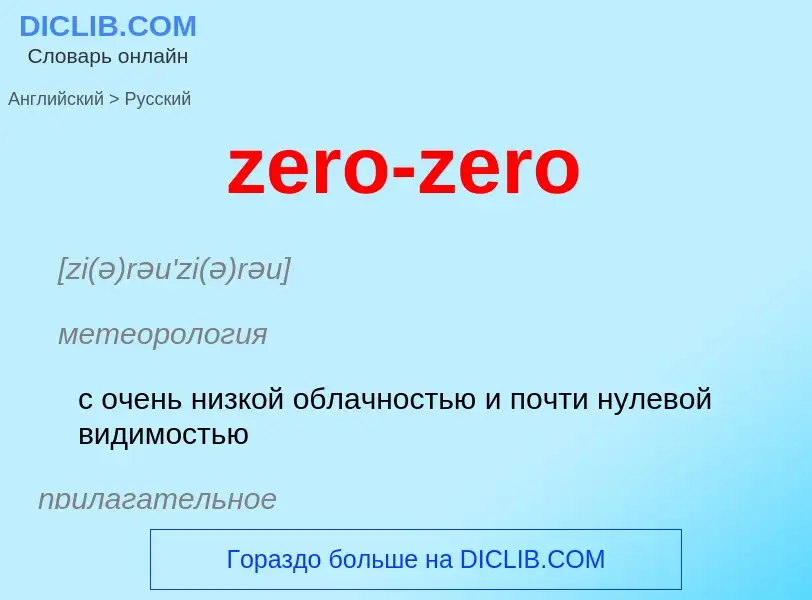Traduction et analyse de mots par intelligence artificielle ChatGPT
Sur cette page, vous pouvez obtenir une analyse détaillée d'un mot ou d'une phrase, réalisée à l'aide de la meilleure technologie d'intelligence artificielle à ce jour:
- comment le mot est utilisé
- fréquence d'utilisation
- il est utilisé plus souvent dans le discours oral ou écrit
- options de traduction de mots
- exemples d'utilisation (plusieurs phrases avec traduction)
- étymologie
zero-zero - traduction vers russe
[zi(ə)rəu'zi(ə)rəu]
метеорология
с очень низкой облачностью и почти нулевой видимостью
прилагательное
метеорология
с очень низкой облачностью и почти нулевой видимостью
['graund'zi(ə)rəu]
общая лексика
эпицентр атомного взрыва
центр
самая середина
ядро
Définition
Wikipédia
Zero Zero was an alternative comics anthology published by Fantagraphics Books from 1995 to 2000. It was printed in a typical 6½″ × 9¾″ comic book format. Issues ranged between 40 and 64 pages in length, printed mostly in black-and-white with a color cover but occasionally including sections printed in one or two colors, notably a series of stories by Al Columbia. Its release schedule fluctuated between bimonthly and quarterly intervals over the course of its run.
A significant proportion of Zero Zero's pages were given over to serialized works, including Richard Sala's The Chuckling Whatsit, Dave Cooper's Crumple, Mack White's Homunculus, Kaz and Timothy Georgarakis's Meat Box, and Kim Deitch's The Strange Secret of Molly O'Dare and The Search for Smilin' Ed. Derf Backderf's short strip "My Friend Dahmer", which he later expanded to an award-winning graphic novel of the same name, also appeared in its pages.
Early issues of Zero Zero were not numbered, but the back cover of each issue featured a captioned illustration depicting an ordinal "Sign of the Impending Apocalypse" which also served as an ad hoc numbering system. For the twenty-seventh and final issue this feature was replaced with an Al Columbia strip, "Vladimir Nabokov's 'Cheapy the Guinea Pig'", depicting the killing of an experimental subject.

![Monument marking the hypocenter, or ground zero, of the atomic bomb explosion over [[Hiroshima]]. Monument marking the hypocenter, or ground zero, of the atomic bomb explosion over [[Hiroshima]].](https://commons.wikimedia.org/wiki/Special:FilePath/Hiroshima-Hypocenter.jpg?width=200)
![In mapping the effects of an atomic bomb, such as on the city of [[Hiroshima]] here, concentric circles are drawn centered on the point below the detonation and numbered at radial distances of 1,000 feet (305 meters). This point below the detonation is called "Ground Zero". In mapping the effects of an atomic bomb, such as on the city of [[Hiroshima]] here, concentric circles are drawn centered on the point below the detonation and numbered at radial distances of 1,000 feet (305 meters). This point below the detonation is called "Ground Zero".](https://commons.wikimedia.org/wiki/Special:FilePath/Hiroshima Damage Map.gif?width=200)

![The [[World Trade Center site]], as it appeared in October 2004. The [[World Trade Center site]], as it appeared in October 2004.](https://commons.wikimedia.org/wiki/Special:FilePath/World Trade Center site 2004.jpg?width=200)
![Aerial view of the [[World Trade Center site]] in September 2001. Aerial view of the [[World Trade Center site]] in September 2001.](https://commons.wikimedia.org/wiki/Special:FilePath/Wtc-photo.jpg?width=200)

